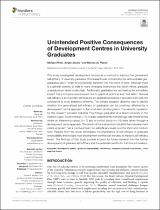| dc.contributor.author | Backer, Jurgen | |
| dc.contributor.author | White, Melissa | |
| dc.contributor.author | du Plessis, Marieta | |
| dc.date.accessioned | 2022-11-02T08:29:49Z | |
| dc.date.available | 2022-11-02T08:29:49Z | |
| dc.date.issued | 2021-12-01 | |
| dc.identifier.citation | Becker J. et al (2021) Unintended positive consequences of development centres in University graduates. Front. Psychol. 12:775377. http://dx.doi.org/10.3389/fpsyg.2021.775377 | en_US |
| dc.identifier.uri | https://dx.doi.org/10.3389/fpsyg.2021.775377 | |
| dc.identifier.uri | http://hdl.handle.net/10566/8124 | |
| dc.description | DHET | en_US |
| dc.description.abstract | This study investigated development centres as a method to improve the generalised self-efficacy of university graduates. This research was motivated by the various challenges, graduates face in order to successfully transition into the world of work. Although there is a general scarcity of skills in many emerging economies like South Africa, graduate unemployment rates remain high. Additionally, graduates are not making the immediate impact that employers would expect due to a lack of technical and “soft skills.” General self-efficacy is an important attribute for job applicants because it provides them with the confidence to solve problems efficiently. The primary research objective was to identify whether the generalised self-efficacy of graduates can be positively affected by a development centre approach in the short-term and long-term. The sample population for this research included Industrial Psychology graduates at a select university in the Western Cape, South Africa (n=17). A quasi-experimental methodology was implemented where an intervention group (n=7) and a control group (n=10) were taken through a development centre approach. The results of the intervention indicated that a development centre approach has a positive impact on self-efficacy levels over the short and medium term. Results from the study emphasise the importance of self-efficacy in graduate employability and indicate how development centres can be used to improve self-efficacy levels. The findings of this study provide a basis for future research into the further development of graduate self-efficacy and the potential benefits for first time job seekers. | en_US |
| dc.description.sponsorship | University of the Western Cape | en_US |
| dc.language.iso | en_US | en_US |
| dc.publisher | Positive Psychology, a section of the journal Frontiers in Psychology | en_US |
| dc.subject | development centres | en_US |
| dc.subject | graduate employability | en_US |
| dc.subject | self-efficacy | en_US |
| dc.subject | competency-based assessments | en_US |
| dc.subject | social cognitive theory | en_US |
| dc.title | Unintended positive consequences of development centres in University graduates | en_US |
| dc.type | Article | en_US |

